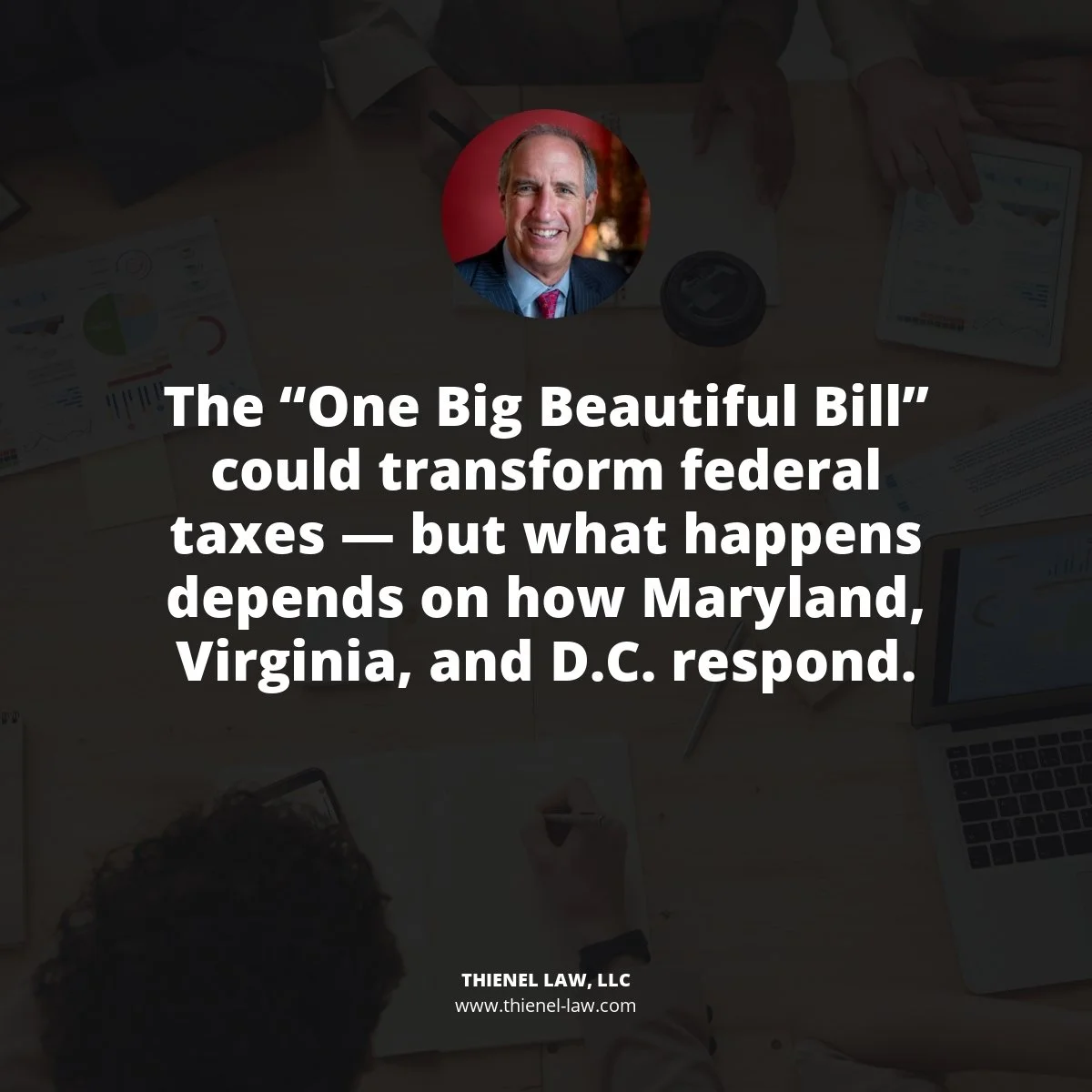States Should Embrace Pro-Growth Tax Reforms in the One Big Beautiful Bill Act
How the One Big Beautiful Bill Could Reshape State Corporate Taxes — and What It Means for You
As a business and tax law firm serving professionals, entrepreneurs, and high-net-worth individuals across Maryland, Virginia, and the D.C. metro area, we keep a close eye on legislative developments that may impact your bottom line. The federal One Big Beautiful Bill Act is one such development — particularly its pro-growth corporate tax reforms.
While the bill covers a wide range of federal tax changes, the real question now is: How will individual states respond?
For businesses in Maryland, Virginia, and D.C., the answer may significantly affect your tax planning strategy going forward.
Let's clarify what's at stake.
Key Takeaways
States have the option to conform to federal tax changes in the One Big Beautiful Bill — especially its pro-growth corporate tax reforms
Conforming to these provisions could simplify tax compliance for businesses operating in multiple states, including Maryland, Virginia, and D.C.
These reforms incentivize capital investment and business expansion, particularly benefiting pass-through entities (LLCs, S-Corps), family businesses, and professional corps
Non-conformity could create complexity and a higher risk of tax inefficiencies or penalties for businesses in the DMV
Business owners should proactively reassess their tax strategies and corporate structures in light of these potential state-level changes
Why Business Owners in the DMV Should Care
Business owners and professionals in our region routinely deal with multi-layer taxation — federal, state, and (in D.C.) sometimes local. With many clients operating in multiple jurisdictions or serving clients across state lines, tax compliance is more than a footnote; it's a critical part of business planning.
The One Big Beautiful Bill Act proposes significant pro-business reforms to the federal corporate tax framework. These aim to reduce compliance burdens, encourage growth-focused investment, and improve alignment between economic reality and tax treatment.
However, since states set many of their own rules when it comes to corporate taxation, they aren't required to align with all of the bill's provisions. Whether Maryland, Virginia, and D.C. choose to conform to the new federal standards could affect year-end planning, entity selection, and even long-term succession strategies for our clients.
Let's break down what's changing — and why it matters.
What Are Pro-Growth Tax Provisions?
At its core, pro-growth tax reform means creating policies that reduce the cost of doing business and incentivize reinvestment.
The One Big Beautiful Bill includes several federal-level changes aimed at:
Enhancing bonus depreciation
Extending favorable treatment for capital investments
Broadening deductions for qualified business expenses
Providing more flexibility for pass-through entity owners
Reducing compliance friction across entity types
For example, many small and mid-sized businesses previously faced phase-outs or caps on depreciation deductions, limiting their ability to recoup investments in equipment, property, or even technology infrastructure. The new rules lift many of these limits, allowing for greater up-front deductions.
That's good news for anyone expanding facilities, growing teams, or reinvesting back into the business.
But — and it's a big one — if state legislatures don't align their tax codes with the federal changes, you could be stuck navigating two different sets of rules.
State Conformity: What It Means and Why It Matters
State conformity refers to when a state adopts federal tax definitions, formulas, and treatment of various items like deductions, credits, and depreciation.
Maryland and Virginia employ different approaches to conformity:
Maryland generally adopts federal changes as they occur (rolling conformity) but automatically decouples from new IRC amendments that exceed $5 million revenue impact for the applicable tax year, unless the Legislature acts otherwise
Virginia moved to rolling IRC conformity effective for tax years beginning January 1, 2023, unless the amendments impact Virginia's general fund revenues by more than $15.9 million in the current or next four fiscal years. If so, the Legislature must adopt the law
Washington D.C. tends to be more selective instead of using a static or rolling framework, incorporating only certain provisions by local legislation
This creates a maze of differing standards. Without conformity to the new pro-growth provisions in the One Big Beautiful Bill, local business owners could face:
Uneven tax treatment on key deductions
Adjustments that trigger added paperwork or estimated tax miscalculations
Increased risk during audits due to mismatched reporting
How This Impacts LLCs, S-Corps, and Professional Practices
The businesses most affected by tax conformity issues tend to be:
Pass-through entities like LLCs and S-Corps
Family-owned businesses with future succession plans
High-income professionals operating under PC (Professional Corporation) or PLLC structures
Let's say your Virginia-based S-Corp takes full advantage of the new federal 100% bonus depreciation for machinery purchased in 2024. If Virginia's tax code doesn't conform, you could owe state tax on that income — even though the IRS sees it as offset.
Or consider a D.C.-based law firm operating as a PLLC. Under the new federal rules, you may qualify for expanded deductions related to digital office enhancements or hiring incentives. But if D.C. hasn't implemented those same rules by the 2025 tax year, you'll need to track and adjust separately.
These scenarios aren't just inconvenient — they're costly. Multi-jurisdiction compliance requires more accounting support, stricter recordkeeping, and often higher tax bills.
Estate Planning and Business Succession: A Hidden Tax Trap
Another under-the-radar area impacted by these tax reform issues is succession planning.
Many of our clients plan to transfer ownership of a family business or real estate portfolio as part of their estate strategy. The federal reforms may enhance benefits for transferring deeply held business assets, particularly when paired with trusts or minority ownership discounts.
However, if the state estate or income tax rules don't match, you could:
Lose significant value in fees or unexpected liabilities when the business transfers
Need to restructure ownership under compressed timelines to meet both sets of guidelines
Miss an opportunity to freeze estate value or reduce taxable income through now-federal-compliant techniques
The solution? Early evaluation of both federal and state frameworks. Don't assume that what's acknowledged by the IRS will be accepted at the state level. Maryland, for instance, has its own estate tax exemption that doesn't currently match the federal threshold. Any further divergence from the One Big Beautiful Bill could widen that gap.
Risk Management Strategies for Uncertain Environments
Until Maryland, Virginia, and D.C. clarify how — or if — they'll adopt these updated tax standards, businesses need to be proactive. Here are a few practical steps to reduce your exposure:
Reassess Entity Structure: With possible mismatch in how states treat deductions and income recognition, your business structure from five years ago may no longer be ideal
Build Flexibility into Expansion or Equipment Financing: Things like Section 179 deductions and bonus depreciation can energize upfront investment — but only when the state matches federal treatment. Build models that account for both
Update Advisory Teams: Ensure your tax, legal, and compliance advisors are coordinating across all jurisdictions where you operate
Review Owner Compensation and Distributions: Changes to how states treat passthrough income could affect whether distributions or W-2 wages are more tax-efficient
Consider Pre-2025 Reinvestment or Gifting Transactions: If your state stays behind the federal schedule, taking action during a conformity window could lock in better treatment
Example: Maryland-Based Estate Planning with Business Interests
One of our clients in Montgomery County owns a chain of family retail businesses structured as a series of LLCs and S-Corps. Under the new federal corporate tax provisions, he could accelerate deductions for reinvestments and shift future growth onto a new trust using a valuation freeze.
But if Maryland doesn't conform to depreciation changes and estate planning norms in the federal bill, the state-level impact could cut into the perceived savings — or trigger unwanted tax exposure.
Our firm's approach was to draft a two-tier structure that allows federal compliance now while remaining neutral on Maryland estate tax until its legislature clarifies conformity.
Example: D.C.-Based Consultancy with Tech Investments
A D.C.-based professional services firm recently upgraded its cloud-based infrastructure and team training programs based on newly expanded federal deductions. However, D.C.'s selective conformity means they must track similar expenses separately for local tax filings.
Where the IRS offers immediate benefit, the firm may have to amortize over years for D.C. calculations — a costly delay. With proper planning, we helped them preserve records and use tax credit carryforwards in a more strategic order, reducing overall liability.
A Clear Need for State-Level Decision Making
Whether states agree or disagree with broader provisions in the One Big Beautiful Bill, one thing is clear: the corporate tax code updates are a step toward modernization. By encouraging reinvestment, simplifying depreciation, and expanding deductions for growth activities, they empower businesses to hire, evolve, and compete.
If Maryland, Virginia, or D.C. choose not to conform, they risk creating friction for the very entrepreneurs and innovators that drive their economies.
In our view, full or selective conformity with the pro-growth provisions would be a smart move — both for policy and for practical business development.
Need Help Navigating State Tax Conformity?
If you're unsure how these forthcoming changes apply to your business or personal planning strategy, we're here to help.
At Thienel Law, we focus exclusively on business, tax, and estate planning for clients in Maryland, Virginia, and Washington D.C. Our guidance is always tailored, practical, and designed to minimize exposure while supporting your long-term objectives.
Schedule a consultation with Steve Thienel to talk through the best strategy for your business or estate planning goals. Let's build a plan that stays one step ahead.
Reach out today to protect what you've built — and position for growth.






